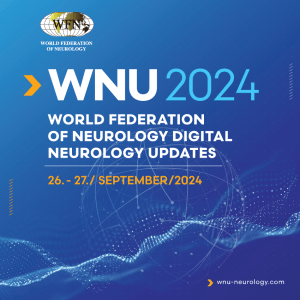The 2023 UKABIF Summit made a return to Salford welcoming, hundreds of attendees to The Lowry for a packed day of speakers and presentations.
UKABIF Chair of Trustees, Professor Andrew Bateman opened the conference to introduce the first speaker of the Summit – Sir Chris Bryant MP, Chair of the All-Party Parliamentary Group for Acquired Brain Injury (ABI).
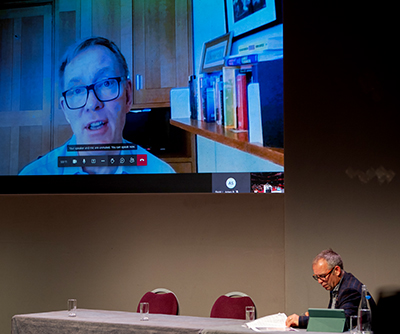
Speaking from Westminster, Chris Bryant gave a much anticipated update on the cross Governmental Strategy for ABI. The Strategy aims to draw together key recommendations from the All-Party Parliamentary Group on ABI report ‘Acquired Brain Injury and Neurorehabilitation – Time for Change’ published in 2018.
Addressing the audience Chris explained how he has been working for a decade to improve the lives of people with an ABI. He talked about the difficulties people with an ABI face navigating the Department for Work and Pensions (DWP), the issues facing children with an ABI within the education system and the postcode lottery of community care following residential rehabilitation.
There are around 1.4 million people in the UK living with an ABI and Chris spoke passionately about not just giving them back their lives, but giving them quality of life.
With regards to an update on the implementation of the Government’s ABI Strategy, Chris spoke of his “frustration and irritation” that the Government has “dragged its heels” with no confirmed date yet to be announced. He did however reiterate his determination that a ten year Strategy will be put in place and answered questions from the floor about how best to encourage MPs to support the Strategy.
The recently launched UK wide platform for clinical TBI (Traumatic Brain Injury) research, the TBI-Reporter, was the focus of Professor David Menon’s presentation. As the TBI-Reporter’s Principal Researcher, Professor Menon explained that globally there are 50 million new TBIs each year and he said the new platform brings together much evidence about people living with a TBI. He said that the annual global cost of neuro trauma equates to around one in every 200 dollars the world makes being spent on TBI or its consequences.
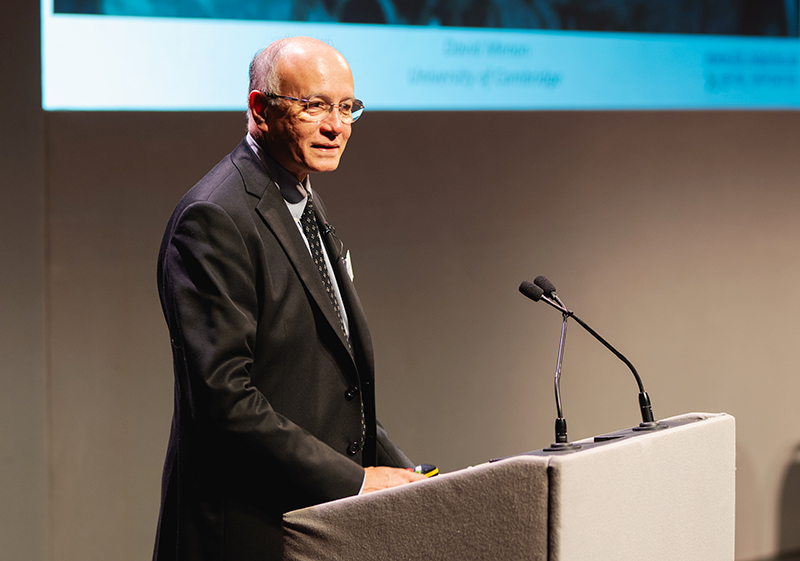
Outlining the current situation, Professor Menon said that while there are global leaders in TBI research in the UK, data is held in relatively disconnected silos and there is a need to better engage people with lived experience of TBI. He said evidence showed there are communities not engaged in UK research, for example covering paediatrics, military, intimate partner violence, homeless people and prisoners.
TBI-Reporter will:
Promote: Open access; patient and public input.
Leverage: Global UK leadership; links with sporting bodies.
Underpin: De-risked drug development.
Facilitate: Research; training/policy development.
Professor Menon spoke about the reclassification of TBIs and the need to move away from the ‘mild’, ‘moderate’ and ‘severe’ categorisations that bring with them ‘baggage’. More information at http://www.tbi-reporter.uk
Next to take to the stage were three young women talking about their experiences of Acquired Brain Injury. The panel, chaired by UKABIF Trustee James Piercy, included members of NABLES’ Young Experts by Experience Advisory Group. They gave their top 5 tips to act as guidance for educational professionals to support the return to education following a brain injury. The tips included:
- Be adaptable
- Be organised and supportive
- Communication is key – including before return to education
The rest of the morning sessions concentrated on ‘women in brain injury’ with Katherine Snedaker, Pro-Bono CEO and Founder of PINK Concussions, the first speaker.
Her talk ‘Sex and Gender differences in Brain Injury and why it matters’ looked at brain injuries from sport, domestic violence, accidents and the military.
She highlighted a House of Lords debate in October 2023 where it was stated “the scale of intimate partner violence, with between 20% to 30% of women affected, is huge, and 90% of those women may suffer brain injury impact.”
Back in 2008, Katherine’s son suffered a series of concussions and at around the same time the Centre for Disease Control (CDC) had issued ‘Heads up’ – information on concussion in sport. Katherine found this information helpful and took it out into the community sports teams and worked to track concussions and change regulations to ensure grassroot sports coaches had to be trained in concussion.
She soon noticed that parents of girls who had suffered from concussion would call her three months after the injury to say their child was struggling and there was the possibility of brain injury. Realising a gap in the information for women and girls suffering concussion she set up the website PINK Concussions.
It became clear that women were being excluded from research – in the laboratories, men decided the menstrual cycle of female animals affected the results so instead they used male animals in research.
But from research starting in 1999, it has been shown that female athletes:
- Sustain more concussions at a higher rate than their male counterparts
- Report a higher number, and more severe, symptoms than males
- Have longer recovery periods than males.
PINK Concussions advocates to develop and implement gender-responsive, evidence based strategies for the identification, management and support of women and girls with brain injuries.
On the theme of sport, Dr Elisabeth Williams, Senior Lecturer at Swansea University, addressed the audience to talk about Brain Injury: Neck Strength and Rugby: The Importance of Sex and Gender.
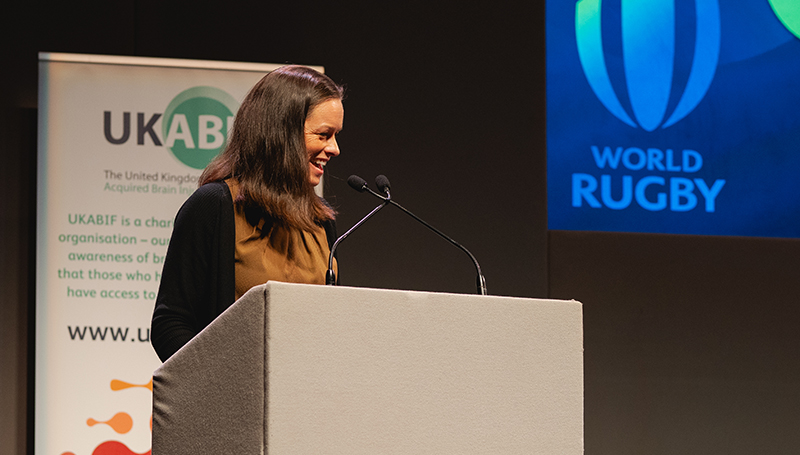
Dr Williams quoted research that states females are ‘2.6 times more likely to suffer a concussion in sport’ and how ‘female cervical spine geometry cannot be scaled from male’. She added women see increased head-neck movement and see increased susceptibility to whiplash and concussive injuries.
She explained that rugby has the highest concussion rate of contact sport. Statistics show that 85% of male elite players have experienced at least one brain injury. Less data is available for the women’s game, despite accounting for 29% of the global rugby population.
Previous research by Dr Williams and Swansea University has shown that female neck strength is 47% lower than male.
Steffy Bechelet and Dr Annmarie Burns of Brainkind led a presentation entitled ‘Too Many to Count; Brain Injury in the Context of Domestic Abuse’. They spoke of their recent research work looking at the potential prevalence of brain injury in domestic abuse survivors.
The World Health Organisation (WHO) estimates that one in three women will experience domestic abuse. One participant in Brainkind’s research said: “every time he hit me, he would hit my head – he would always say it was the one place that wouldn’t bruise…it was too many times to count…”
They went on to say it is recognised that domestic abuse is one of the top causes of acquired brain injury in women across the world.
The Brainkind research included 60 participants with an age range of 18-72 years. While 46% reported being strangled at least once, 75% said that they had been held in a way that they felt they couldn’t breathe. 80% of the participants reported at least one significant blow to the head.
The research showed there is a lack of understanding of the signs and symptoms of brain injury and there are health and social inequalities.
Next steps and recommendations include: further research, screening methods and tools, training for professionals and policy and legislative change.
The final session of the morning saw Ellie Atkins, Manager and Safeguarding Lead at Manchester City Council, tell the story of ‘Jessica’ in the context of ‘How can the Care Act (2014) and Social Work leadership in safeguarding support bespoke approaches working with women with acquired brain injury?’
Ellie introduced the audience to Jessica, a woman who drinks alcohol and sleeps rough in Manchester. The team at Manchester City Council have known and worked with Jessica for eight years. Jessica told them of childhood neglect, sexual abuse from a family member and how she lost her baby in a car accident. Jessica experienced a significant head injury from the impact of that car accident.
Ellie said that research shows that 85% of homeless people will have experienced childhood trauma and 50% will have an acquired brain injury. She talked about Executive Function which is:
- Controlled by our frontal lobes of our brain
- Cognitive processes for the control of our behaviour
- Skills that help humans get things done.
With regards to Jessica, Ellie said it was extremely difficult to engage with her as she wouldn’t hold on to a topic long enough for it to register and she couldn’t recall or retain information. Jessica was later diagnosed with PTSD and an acquired brain injury and she has hidden disabilities.
Ellie finished by saying Jessica is now thriving in a provision for women with an acquired brain injury; she feels safe and is in recovery from alcohol addiction.
The first session of the afternoon saw Professor Mike Barnes address the audience with his presentation ‘The role of cannabis in recovery from brain injury.” Professor Barnes, a former UKABIF Chair of Trustees, explained that medicinal cannabis has been legal in the UK for the past five years and its origins see that it was the first medicine written down by man, having been used as a medicine for more than 5000 years.
In this country, 120 doctors can now prescribe medical cannabis and 32,000 people are prescribed cannabis, with 31 on-line clinics. It is used for a number of conditions:
- 34% prescribed for anxiety and related conditions (PTSD)
- 58% for chronic pain
- 3% for MS
- 1% for epilepsy.
With regard to Traumatic Brain Injury, medical cannabis can act as a symptom control:
- Analgesic
- Anti-anxiety
- Anti-spastic
- Anti-convulsant.
To date, the current situation is that there are only four NHS prescriptions for cannabis (all children) and GPs cannot initiate cannabis prescriptions.
Professor Barnes stressed the need for more independent prescribers, improved training for doctors and better public awareness, as at least 70% of people do not know that cannabis is medically legal.
Liz Twist MP, Vice Chair of the All-Party Parliamentary Group (APPG) for Acquired Brain Injury and Chair of the APPG for Suicide and Self Harm Prevention, gave an update on the National Suicide Prevention Strategy which was published by the Government in September 2023. She spoke about the implications for people with an Acquired Brain Injury, how they may be affected by the risk of suicide and what can be done to prevent it.
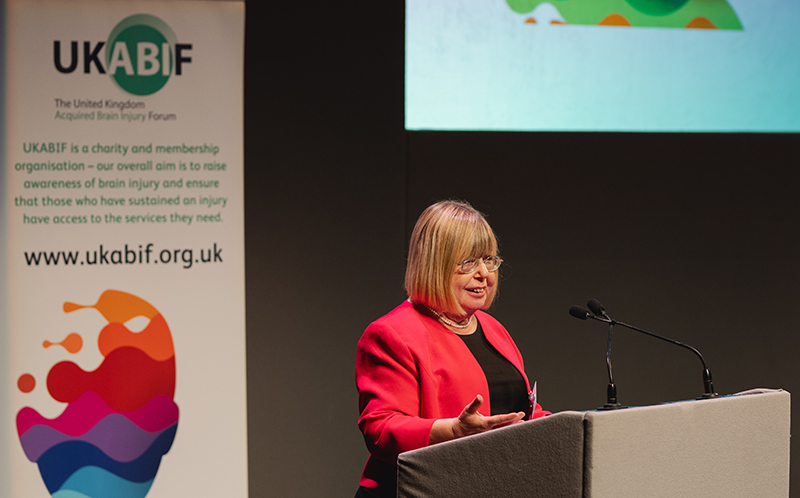
Liz Twist reiterated the importance that both the APPG for Suicide and Self Harm Prevention and the National Strategy are cross-departmental and work must happen across all departments in Government. She stressed that suicide prevention is not just a health issue – it is an issue for all of us.
She explained how she had asked the House of Commons Library for figures and research on ABI and suicide, and had realised there is very little. However, the information did show that in 2018 researchers from the Danish Research Institute of Suicide Prevention had examined the records of more than 7 million TBI survivors over a period of 34 years. Their findings showed that experiencing a TBI increased risk of suicide from 1 in 200 to 1 in 100.
Ahead of the publication of the Suicide Prevention Strategy, Liz Twist said that UKABIF and other organisations had submitted detailed findings to the consultation, which showed rates of suicide and self harm in individuals who have a diagnosis of a neurological condition are significantly higher than those without a diagnosis. She expressed concern that the suicide strategy does not mention the impact that having an ABI or TBI has on having suicidal feelings. She also stressed it is important that we don’t see mental health and suicide as the same thing, adding that many people who take their own lives do not have any mental health diagnosis at all.
Suicide and self harm in prisons was the focus of the presentation by Hope Kent, PhD Researcher at the University of Exeter. She spoke about research revealing that suicides constitute 24% of deaths in police custody and prisoner suicide rates are between 3 times and 8 times the rates for the general population for males and 10 times the general population for females.
In 2021, the House of Commons Justice Committee found that in UK prisons, 10% of prisoners were receiving mental health interventions while 70% were estimated to be in need of mental health interventions.
She went on to say that an unannounced inspection of HMP Foston Hall in 2021 showed “as an indicator of the level of distress, women were making 1,000 calls a month to the Samaritans”.
She added that 32% of prisoner suicides happen within the first seven days in prison and how it is critical that we think about prison screening practices and to be able to identify risk factors.
A study in HMP Parc in Wales saw 852 adult male prisoners screened on entry to the prison. This screening included the question “Have you ever had an injury to your head that caused you to be knocked out and/or dazed and confused?”
Results showed that 9% reported a TBI and 12% reported a history of suicidality.
Hope added that brain injury is a hidden risk factor for suicide in prisons and reiterated the importance of screening for traumatic brain injury.
Dr Eleanor Bryant, Time for Change Wales, gave an update on the UK-based survey exploring educators’ perception of childhood ABI. She began by saying the exact prevalence of childhood ABI remains unknown but it is thought that at least 40,000 are affected by ABI each year.
ABI has long-term consequences for learning, with key issues including children with ABI having unmet needs and the lack of information sharing and communication between healthcare and schools.
Eleanor explained that the UK-wide survey covered themes such as knowledge of childhood ABI, school policies and procedures and confidence levels in teaching a child with ABI.
To date, 193 participants had responded including a range of roles within the education system and a good balance of primary and secondary schools. The survey asked about training on ABI and while 51.6% of participants had supported a child with ABI, only 43.4% had completed training about ABI.
Recommendations include a need for a proactive rather than reactive approach to training and the sharing of best practice of policy and procedures.
The penultimate presentation of the Summit came from Dr Jenna Moffitt, Consultant Neuropsychologist at Cygnet Health Care and Dr Don Brechin from James Cook University Hospital in Middlesbrough. They were looking at ‘Tools to Change the Future of Neurorehabilitation Services: Engaging Integrated Care Boards in the Neurorehabilitation Agenda.’
Their work has concentrated on the North East and North Cumbria region – an area with a population of 1.3 million, covering 14 Local Authorities and 64 Primary Care Networks.
Dr Moffitt and Dr Brechin started collecting and collating data 10 years ago and results showed key drivers for change included system pressures, clinical evidence, financial case and patient voices. Lack of funding impacts discharge delays and waiting times. Staffing levels across the region has also been an issue and it is clear that hospitals have kept patients on wards longer due to the lack of community rehabilitation services.
Dr Brechin said that delaying someone in hospital for one week would pay for 6 people to be treated by specialist teams in the community.
The Summit closed with a presentation by Andrew Axon, Park Lane Plowden Chambers on the subject of ‘Navigating litigation to achieve the best results for patients’.
Andrew started by saying that litigation provides an opportunity to improve an injured person’s life. He added the importance of getting to the bottom of an individual’s needs; securing rehabilitation and seeking damages so needs can be met in the longer term.
In order to achieve the best outcome, Andrew highlighted the following areas:
- Help: Understand that the client’s life has changed; start with rehab
- Understand: Understand your client’s needs
- Communicate: Manage the flow of information to communicate your client’s case.
The need for ongoing support after the initial rehabilitation period is crucial. Andrew spoke of situations where he has visited a client 12 months after discharge from rehab and they have been significantly worse because they have fallen into a void and lacked ongoing support.
The need to recognise everyone is individual is key and one size does not fit all. It is imperative to understand the story and narrative of a person.
The UKABIF Summit welcomed hundreds of attendees. It was sponsored by Irwin Mitchell, Cygnet Health Care, Leigh Day and Frenkel Topping Group.
The winners of the annual UKABIF Awards were announced on the eve of the Summit at a fantastic fundraising dinner at The Lowry. The Awards, sponsored by Thompsons Solicitors, saw the Stephen McAleese Award for Inspiration go to joint winners. Leon, who suffered a brain injury aged 28 years, was recognised for his work as a mentor at Rehabilitate, while Dr Jenna Moffitt and Dr Don Brechin were recognised for their work in research and data showing what further provisions are needed to support people affected by brain injury in the North East of England.
The Mike Barnes Award for Innovation went to Melo – an AI driven app that is designed to help clinicians better understand challenging behaviours and improve the way data is used to support patients. Finally, the Poster Award went to Dr Charlie Whiffin of Anchorpoint ABI for her poster on ‘Life Threads’.

